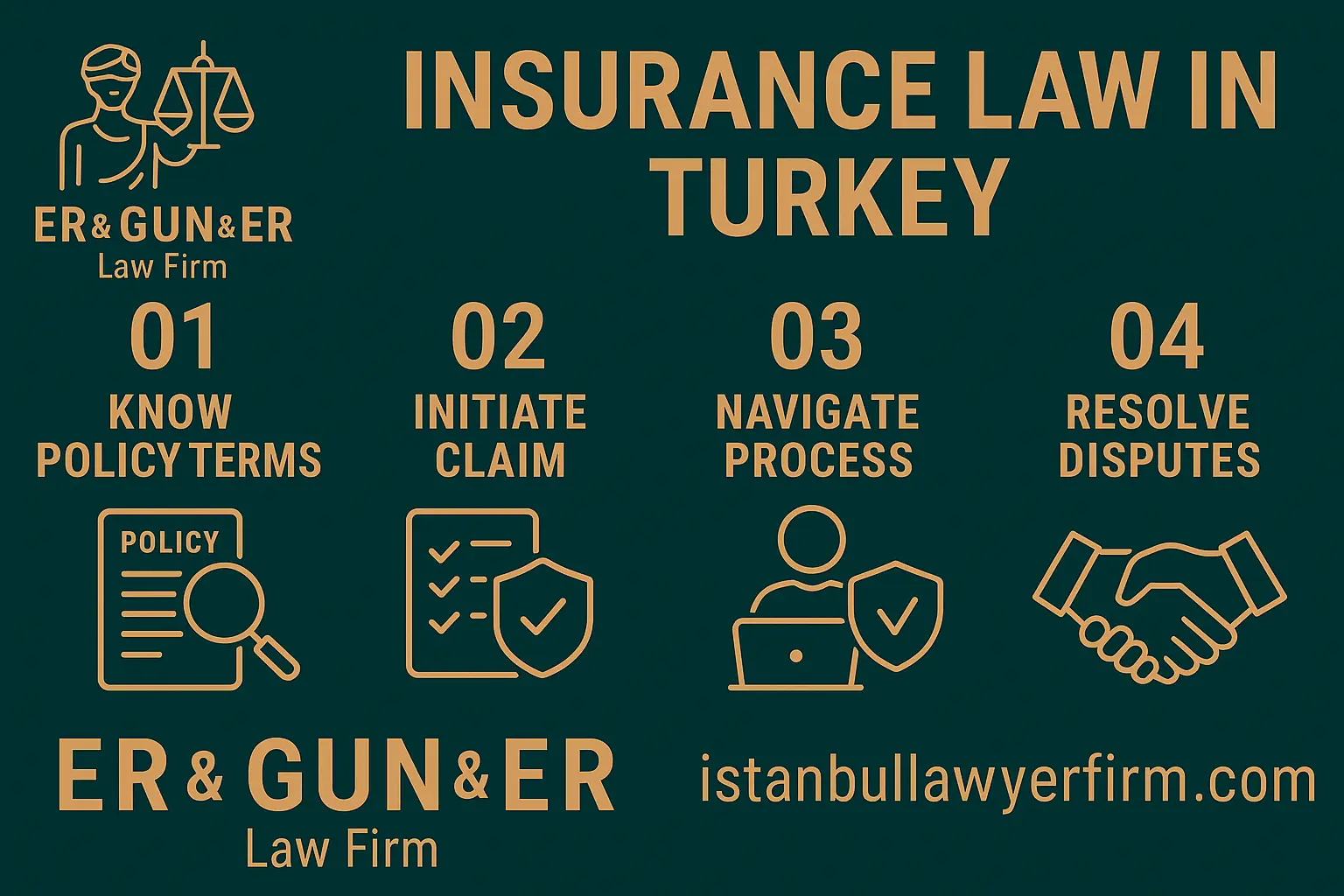
Insurance law in Turkey governs the legal relationships between insurers, policyholders, beneficiaries, and third parties under the Turkish Commercial Code and Insurance Law No. 5684. From life and health insurance to motor vehicle, property, liability, and business interruption policies, legal clarity is essential in drafting, interpreting, and litigating insurance matters. At Istanbul Law Firm, our English speaking lawyers in Turkey advise individuals, insurers, brokers, and commercial policyholders on insurance claims, litigation, and regulatory compliance.
Whether you’re seeking compensation, contesting a denial, or defending an insurer in court, we offer strategic legal representation tailored to the policy type and risk structure. Recognized as a best lawyer firm in Turkey for insurance law, our team resolves disputes efficiently and in line with market practice and legal precedent. Related: How to File and Enforce an Insurance Claim in Turkey, Understanding Insurer Obligations Under Turkish Law
Policy Types and Legal Obligations in Turkish Insurance Law
Turkish insurance law classifies policies into life and non-life categories, encompassing health, motor, property, liability, and specialty insurance (e.g., marine, professional indemnity). Each policy type is regulated by general and special conditions issued by the Insurance and Private Pension Regulation and Supervision Agency (SEDDK). Insurers and policyholders must comply with duties of disclosure, premium payment, risk notification, and claims cooperation. At Istanbul Law Firm, we help clients interpret policy language, understand exclusions, and ensure proper risk transfer structures under Turkish Commercial Code provisions.
Our English speaking lawyers in Turkey review policy wording for ambiguity, advise on regulatory updates, and resolve interpretation issues involving deductibles, co-insurance, force majeure, and jurisdiction clauses. We also assist businesses in customizing industrial policies and group insurance programs in line with sector-specific risks and multinational standards.
As a best lawyer firm in Turkey for insurance advisory, Istanbul Law Firm ensures that all contractual and statutory duties are fulfilled to reduce litigation exposure and improve claim defensibility. Related: How to Legally Review Insurance Policies in Turkey, Overview of Common Insurance Policies in Turkish Law
Insurance Claims Process, Denials, and Legal Remedies
Filing an insurance claim in Turkey involves submitting a written notification to the insurer within a legally specified period—typically 5 to 10 days after the insured event. The insurer must then assess the claim and provide a decision within 15 to 30 days, depending on the policy type. At Istanbul Law Firm, we guide policyholders, beneficiaries, and businesses through each step of the claims process, ensuring accurate submission, document sufficiency, and legal compliance with notification timelines and supporting evidence.
Insurers often deny claims based on policy exclusions, incomplete documentation, or alleged misrepresentations during application. Our English speaking lawyers in Turkey challenge denials by issuing legal notices, initiating mediation before the Insurance Arbitration Commission, or filing civil lawsuits. We also pursue bad faith damages and interest claims where unjustified delays or wrongful refusals occur. For high-value and cross-border policies, we coordinate with reinsurers and foreign counsel to ensure global enforceability.
As a best lawyer firm in Turkey for insurance litigation, Istanbul Law Firm offers both policyholder and insurer representation in claim disputes involving motor accidents, life coverage, health denial, and fire or earthquake losses. Related: What to Do If Your Insurance Claim Is Rejected in Turkey, Legal Remedies for Disputed Claims in Turkish Insurance Law
Subrogation, Reinsurance, and Insurer Liability
Subrogation (rücu hakkı) allows insurers in Turkey to recover claim payouts from liable third parties after indemnifying the insured. This right arises automatically under the Turkish Commercial Code and plays a critical role in liability, fire, and motor accident claims. At Istanbul Law Firm, we represent insurers in subrogation recovery actions and help policyholders navigate subrogation defenses, including contributory negligence, coverage limits, and third-party releases.
Reinsurance agreements, common among insurers operating in high-capacity or specialty markets, must comply with international treaty standards and SEDDK reporting obligations. Our English speaking lawyers in Turkey draft and review facultative and treaty reinsurance contracts, manage dispute resolution under ICC and LCIA rules, and advise on jurisdiction and governing law clauses. We also handle local representation of foreign reinsurers in Turkish court enforcement and insolvency protection claims.
As a best lawyer firm in Turkey for insurer-side legal services, Istanbul Law Firm protects reinsurance integrity, regulatory compliance, and post-claim recoveries across complex insurance structures. Related: How Subrogation Works in Turkish Insurance Law, Legal Framework for Reinsurance Agreements in Turkey
Regulatory Compliance, Licensing, and Insurance Supervision
All insurance companies, brokers, agents, and adjusters operating in Turkey are subject to licensing and regulatory oversight by the Insurance and Private Pension Regulation and Supervision Agency (SEDDK). Compliance obligations include solvency requirements, product filings, reinsurance disclosures, anti-money laundering (AML) controls, and consumer protection standards. At Istanbul Law Firm, we assist local and foreign insurers, MGAs, and intermediaries with license applications, policy registration, and ongoing regulatory reporting to ensure uninterrupted operations.
Our English speaking lawyers in Turkey also represent clients during audits, administrative inquiries, and SEDDK inspections. We advise on enforcement defense, product withdrawal, regulatory remediation, and corporate restructuring under Turkish insurance company law. We also assist fintech and insurtech platforms entering the Turkish market with sandbox applications and digital compliance readiness.
As a best lawyer firm in Turkey for insurance regulatory matters, Istanbul Law Firm helps institutions meet legal obligations while maintaining commercial flexibility in a tightly regulated market. Related: How to Get Licensed as an Insurer or Broker in Turkey, Regulatory Reporting Duties in Turkish Insurance Law
Why Istanbul Law Firm Is the Trusted Legal Advisor for Insurance Law in Turkey
Insurance disputes and compliance issues require specialized legal knowledge, fast response, and strategic planning. At Istanbul Law Firm, we deliver comprehensive legal services in insurance claims, underwriting compliance, broker liability, reinsurance, and regulatory defense. Whether you're a global insurer, local policyholder, claims adjuster, or reinsurer, we provide bilingual legal advice and courtroom advocacy across Turkey’s insurance ecosystem.
Our English speaking lawyers in Turkey have decades of experience drafting policies, litigating coverage disputes, and guiding foreign clients through local regulatory frameworks. We manage the legal complexities of claim recovery, insurer risk analysis, and commercial insurance contracting with clarity, efficiency, and precision.
Recognized as a best lawyer firm in Turkey for insurance law, Istanbul Law Firm protects your legal position and enforces your insurance rights across every policy, dispute, and risk scenario. Related: Why Legal Strategy Matters in Insurance Disputes, Managing Insurance Compliance Risk in Turkey
Frequently Asked Questions (FAQ)
- Can foreigners buy insurance policies in Turkey? – Yes. Foreign nationals can legally purchase health, property, motor, and life insurance policies from licensed Turkish insurers.
- What if my insurance claim is denied? – You can challenge it through the Insurance Arbitration Commission or civil courts. We handle all legal remedies for denied claims.
- Are all insurance policies in Turkey subject to regulation? – Yes. The Insurance Law and SEDDK regulate all policy terms, pricing, and distribution. We ensure full legal compliance.
- How long do I have to file an insurance claim? – Generally 5 to 10 days after the event, depending on the policy. Late filing may affect coverage. We help you file on time.
- Can insurers in Turkey limit their liability? – Only within legal bounds. Unlawful exclusions may be invalid. We review policy wording to detect and challenge unfair clauses.
- What is subrogation in Turkish law? – After paying a claim, the insurer can recover from the liable third party. We handle subrogation claims and defenses.
- Can I sue an insurer in Turkey? – Yes. Insured parties can sue for non-payment, bad faith, or unfair terms. We represent plaintiffs and defendants in all courts.
- Is life insurance payout taxable in Turkey? – No, generally not. We confirm exemption status and assist with documentation.
- How are motor insurance claims handled? – Through regulated liability and CASCO policies. We litigate against insurers for denied or undervalued vehicle damage claims.
- Are brokers and agents liable for mistakes? – Yes. Misrepresentation or negligence may create legal liability. We file claims or defend agents in such cases.
- What is the role of SEDDK? – It licenses, regulates, and supervises the insurance market. We handle all filings, licensing, and compliance matters with the agency.
- Who is the best law firm for insurance law in Turkey? – Istanbul Law Firm—a best lawyer firm in Turkey—offering top-tier legal services in claims, compliance, and litigation.
Contact Our Turkish Insurance Lawyers Today
Whether you're enforcing a claim, resolving a denial, or ensuring insurance compliance, Istanbul Law Firm delivers expert legal advice across every policy and dispute. Our English speaking lawyers in Turkey represent policyholders, insurers, and intermediaries in coverage, subrogation, and regulatory matters. As a best lawyer firm in Turkey for insurance law, we protect your rights and defend your interests with speed and legal accuracy. Contact us now for a claim strategy or compliance audit.


